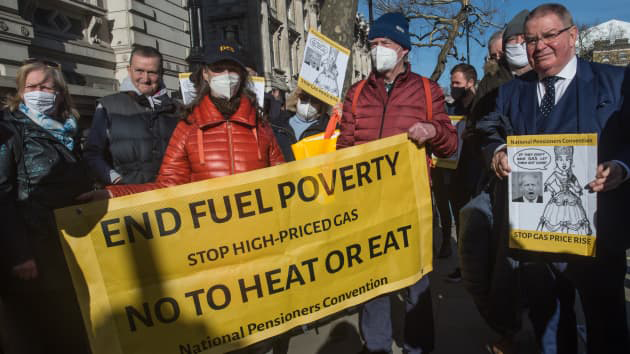
As a result of rising inflation, declining real wages, and an energy crisis, British households are suffering their greatest cost-of-living problem in decades.
Inflation in the United Kingdom has surged to levels not seen in decades, with the latest figure for December reaching 5.4% on an annual basis, the highest level since March 1992.
The government declared this month that welfare payments tied to inflation will increase by 3.1% in April, in line with the Consumer Prices Index reading from September 2021. In addition, state pensions will be enhanced by 3.1%
According to the most recent official figures, average earnings declined by roughly 1% in November from a year earlier, the first drop in income since the peak of the coronavirus pandemic.
Meanwhile, starting in April, taxes on earned income will rise by 1.25% to help cover health and social care costs. Prime Minister Boris Johnson is said to be pushing through with the decision, despite criticism from within his own party to reverse course.
According to data released on Friday by the Office for National Statistics in the United Kingdom, one in every five British adults claimed they had difficulty paying their expenses in the previous month, compared to a year ago.
Learn how to trade crypto, Forex, CFDs, and other instruments in the United Kingdom with trusted brokers
More than two-thirds of adults indicated their cost of living had increased since November, with the most common cause being higher food prices. Almost 3,500 people were questioned by the ONS.
According to statistics from analytics firm Kantar, grocery costs in the United Kingdom increased by 3.8% in the four weeks ending January 23 compared to the same time a year ago. The company’s research looked at the price variations of over 75,000 products over the course of a year.
“Over the course of a year, this price increase could add an extra £180 ($244) to the average household’s annual grocery spend,” said Fraser McKevitt, Kantar’s head of retail and consumer analytics.
“We’re likely to see buyers looking for cheaper products and discounts in order to keep expenses down.”
Energy Crisis
On Thursday, Ofgem, the UK’s energy regulator, raised its energy price cap by 54%, implying that millions of homes’ yearly energy bills will rise by about £700 from April.
Because of the United Kingdom’s reliance on natural gas as a source of energy, the country has been particularly heavily hit by a gas shortage, which pushed wholesale prices across Europe to record highs last year.
Rishi Sunak, the British Finance Minister, stated on Thursday that beginning in October, all home electricity users will be given a £200 loan as a discount on their rates, which will be repaid in £40 installments over five years. He also stated that the vast majority of homes would receive a £150 council tax rebate — Households pay a charge based on the value of their home.
However, many small business owners in the United Kingdom have expressed anxiety about the viability of their businesses as costs rise.
Impossible alternatives
Food banks are a good cause. Foodbank use surged in 2021, according to the Trussell Trust, and it’s not expected to improve as individuals face “difficult decisions in response to the rising cost of living crisis.”
Between April and September, The Trussell Trust distributed at least three food parcels every minute to individuals in need, which was 11% more than before the outbreak.
In an email to CNBC, Garry Lemon, policy director at the Trussell Trust, said, “With inflation reaching a 30-year high, our social security system is at breaking point, and critical prices across the board are growing rapidly.”
In an emailed statement, Danielle McKenny, owner of West Midlands-based beauty company Gaea’s Garden, said, “The past two years have been absolutely catastrophic for small businesses.” “While our revenues are down, the cost of living and eating has risen dramatically.”
“For the first time in many years, I’m afraid,” Jenny Blyth, owner of Storm In A Teacup Gifts, wrote via email.
“My regular sales aren’t enough because of the growing cost of living and skyrocketing food and petrol expenses,” she noted. “I can’t afford to heat my house and run my business at the same time.” So, what am I going to do?”
“We recognize people are facing a cost of living pressures, which is why we are taking decisive action through a £200 discount on bills this autumn and a £150 non-repayable reduction in Council Tax bills, on top of the existing £12 billion of support we already have in place,” a UK government spokesperson told CNBC in an emailed statement.
“To effectively assist the most vulnerable, the government must align benefit payments with the predicted cost of living in April or risk driving more people to food banks. Our social security system must function as a lifeline for all of us.”
Subscribe for our newsletter
Get Forex brokers reviews, market insights, expert analytics and education material right into your inbox for free!